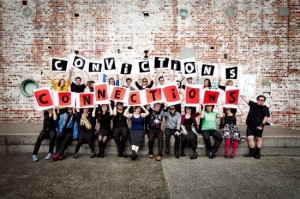
(A ha! How the tables turn! Wesley Enoch late to his own session! And who can blame him – it was nearly impossible in our punch drunk state to come inside away from the river and re-engage yet again with the issues facing our sector.)
In the final session of the Australian Theatre Forum it was time to descend into the VISY for the summing up of the findings hosted by Anni Davey and Wesley Enoch to reveal the democratically decided issues considered by the delegates to be most pressing. Of course there was the disclaimer that this was not a list of the only priorities “just what has floated up to the surface.”
So here we are with the strategies – and encouraged to think that we are not alone in our ideas or strategy or passions and this should encourage all of us to act.
The list talked of :
the importance of young people- as artists and audiences
the pressing urgency of green/sustainable arts practice
The need to create support networks
The importance of advocacy and development of cultural policy.
And then it was time for some impressions from some artists reflecting on the experience over the past 3 days
Candy Bowers did what Candy Bowers does – asked us to connect and re-think what it means to sit in the company of each other. She asked us to hold the hand of the person next to us. Then she asked us to put our pointer finger in the palm of the person next to us and then slide our hands together, then grasp each other. then asked us to close our eyes and take our time before we opened our eyes. And when we finally dared to open our eyes, there she was – slow dancing with Fiona Winning.
And then suddenly the floor filled with spontaneous slow dancing… people, artists, administrators took to the floor in an act of joy and affection.
And the room erupted in applause.
Anni Davey -“And then we danced until we listened to the sound of us clap each other”
Tim Stitz delivers a spoken word response – a huge cooking metaphor about making and educating and experimenting…. ending with the idea “to cook to eat and to savour there is nothing sexier than passion.”
And then the floor opened up –
“Now that we are driving in our new maps – that we should all be aware of our blind spots.”
A wish “That in 2012 that theatre is considered equal to sport and that we are conscious of the words and metaphor we use when we talk about theatre.”
An acknowledgement of how this forum has been the “Most non male and non white theatre group that I’ve seen.”
Fiona Winning –
Thanks the volunteers – Thomas Banks (VIC), Gabrielle Castle (QLD), Athalia Foo (QLD), Ella Holmes (VIC), Eloise Maree (QLD), Anna Molnar (QLD), Benjamin Schostakowski (QLD), Nathan Sibthorpe (QLD), Billy Stewart-Keed (QLD), Alexandra Talamo (VIC), Kristen Trollope (QLD), David Vespertine (QLD).
Then thanks the partners – MetroArts, Powerhouse, to the Brisbane Festival, the Brisbane artists community, Nest for Change for the picnic on Wednesday night.
And then she thanked the documenters –
Leon Ewing – who has brought his own camera and documented everything
Bionny Kidd from Australianplays.org who has also documented feedback on the forum.
And then the sponsors –
Brisbane City Council, DCA, ArstSA, ArtsVIC, ArtsNSW, ArtsQLD, ArtsWA, Melbourne Theatre Company and Back to Back theatre who bought some delegates airfares.
The ATF Committee – Committee members are: Nicole Beyer, Director Theatre Network Victoria (Chair); Candy Bowers, Freelance Superstar; Lenine Bourke, Artistic Director Contact Inc; Liz Burcham, CEO Metro Arts; Wesley Enoch, Artistic Director Queensland Theatre Company; Kristy Edmunds, Artistic Advisor Park Avenue Armoury New York; Fiona Maxwell, Queensland Manager Artsupport Australia; Chris Mead, Director Playwriting Australia; Rose Myers, Artistic Director Windmill Theatre; and Alicia Talbot, Artistic Director Urban Theatre Projects.
The ATF team – Nicole Beyer, Tija Loadens, Rebecca Meston, Paul Bardini.
And of course there we were – a whole room of theatre people – inter-generational, multi-disciplinary, multi-skilled, ever-hopeful, miming a champagne toast to the future.
(Applause and evacuation to the bright Brisbane sunshine and the last of the free drinks)
Here’s Jane Howard’s feedback and reflections –
http://noplain.wordpress.com/2011/09/16/australian-theatre-forum-and-thats-all-there-is/
And of course, you can’t go past the queen of theatre blogging, Alison Croggan’s Summary –
http://theatrenotes.blogspot.com/2011/09/australian-theatre-forum.html
For me, there are a few things that I feel compelled to say…
I was at the forum because of the grace and vision of Fiona Winning and Rebecca Meston – who felt it was important for me to attend. It is thanks to ArtsNSW that I got a chance to sleep somewhere safe, travel comfortably, eat occasionally. I would not, as an independent artist and blogger (hate that word) be able to do it any other way. I was there to report (I felt) on the event for my fellow indy artists who aren’t able to spend the time or the money to engage with this conversation.
This is a great shame. We are still operating in a model which speaks to companies and funded organisations – and often artists themselves are left out of the conversation. There’s a combination of things to blame – and I don’t knwo what the solution is – but there is a dominance of the company structure in forums like this – and the brave, solo voice can sometimes get lost.
I found the forum to be very intense. A lot of words – heard, thought and typed. A lot of text. By Friday night I was relieved to be abducted and taken to a Butoh show (still don’t like Butoh) – and then a magic show. I needed to remain mute for the rest of the weekend, and even now I am only re-emerging into the world.
There seemed to be three major sections to the Forum –
1. ADDRESSING THE CULTURAL POLICY PAPER
2. WHAT CAN WE DO TO MAKE OUR INDUSTRY BETTER?
3. WHAT’S EVERYONE ELSE DOING?
It was a lot to take in and absorb – and I am still digesting and processing – yes, I feel like I have eaten too much – and it was good because I was hungry for this level of conversation, and the conversation was at times very nourishing, but I just went over board.
I want to thank a few people – Rebecca Meston, Fiona Winning and ATF for having me, Dan Evans for hosting me at his awesome picnic, Jane Howard for being the best co-hort/adventurer a compulsive blogger can have, Sam Hawker for keeping me afloat and watered, Sam Strong for that glass of wine, Lachlan Philpott for being so funa dn provocative, Kit Brookman for being OK with me crying at that Chinese restaurant in the Valley, Ross Mueller for the amusing side anecdotes, Michal Imielski for being uber patient/kind/nurturing/reassuring as I verbally processed everything I was experiencing.
I may share the aftershocks with you as I recover from the erruption of ideas within me over the next few days/weeks/months.
All I can say is – the Australian theatre industry/community are fierce, articulate, intelligent and a force to be reckoned with. I’ve said it before – never EVER underestimate a theatre person’s passion or energy – it is unparalleled.
]]>
It’s been an intense few days – and I think I am hitting a saturation point. It is a magnificent form of torture being surrounded by 260 odd (and I mean odd) people, having confronting conversations and asking provocative questions. It has been great. Huge. Challenging. Great. It’s been great.
But I feel I may have gone a little crazy… (in a gentle way)… At this moment I’d love to unplug myself and be asleep on the grass in the park outside the Powerhouse… eat an apple and listen to the birds.
And it’s a bit shit timing as the results are being presented.
But theatre people are unrelenting and high energy. They are fiercely intelligent, passionate and wildly articulate – interesting and have great ideas. It’s hard to catch everything. It’s hard to harness all my thoughts… and so despite all this documentation and notation of the Forum, I think I might wait until I have some time and space away from the Australian Theatre Forum to reflect and do some Blue Sky Dreaming of my own.
I think a great perspective is offered by Alison Croggon who is now safely back in Melbourne – and you can check that out here: http://theatrenotes.blogspot.com/2011/09/australian-theatre-forum.html
Anyway…
Here’s a song…
]]>
Emerging from the Open Space discussions, key priority areas will be discussed in further detail with breakout groups devising a series of strategies and actions. FACILITATOR: Wesley Enoch
Post coffee and a biscuit (well two biscuits… I needed them…) we now confront the tough work of the Forum… detail around the key topic areas.
Yesterday’s discussions have been distilled down to ten key focus points. And we have been asked to choose one topic to contribute 5 action points (recommendations) for these topics:
Supporting Independents
Mobility and Touring
Partnerships & Collaborations
Creativity & Imagination
New Ways of Managing
Arts Action – Politics and Money
Digital, NBN & New Oportunities
Young people and theatre
Sustainability (environmental)
Mix it up – Diversity & Barriers.
NOTES ON HOW TO PARTICIPATE IN THIS DISCUSSION:
You hold the memory of all you’ve discussed. Take that into the next discussions.
Some practical outcomes are already in train. Take them into the next discussions.
Be practical.
Only delegate to people in the group.
Don’t rely on a committee to do it.
So off I went… after pin-balling between a lot of groups – Supporting Independents (decided to be filled in by Sam Hawker over a cup of tea later) then Mix it up (decided that Candy Bowers could be my voice for that one) and thought I should in my Shopfront capacity/love of grassroots and emerging playwrights to the Youth Theatre group (Decided i would leave that to Jane Howard to write up) and so I landed in Arts Action – Politics and Money chaired by Brenna Hobson – which I think is probably where I could learn and listen the most in…
It’s timely especially since the Cultural Policy discussion is warming up.
It’s also quite interesting after a rather heated discussion on my facebook page (which I posted here ) between an arts academic and a newly appointed Associate artist – both who were very protective of the current funding models and ideas around who is entitled to call themselves an artist. Interesting to me because I think the waiting for legitimization by an institution is one of the problems with the dull, white, middle-class, over-educated arts sector. I don’t think a piece of paper from an institution makes an artist. I think practice makes an artist.
There are lots of questions buzzing around… what do we think about what we need culturally? What do artists need to ask for? What are our priorities? –
Should there be a stipend for artists?
How do you authenticate who an artist is?
How do you validate who an artist is?
Should it be a membership based standard?
But do you nominate as an artist at the Tax office?
Where is the discussion about cultural citizenship in the cultural policy document?
Should these discussions be driven more by cultural/arts sector NOT bureaucracy?
Is there an interest about supporting the $20 million touring/cultural exchange plan?
Why aren’t there artists on the boards of multi-national companies to add a new perspective?
How can the resources given by the government best serve ALL of Australia?
Should we have a “what can you can do” document for artists to be able to better find and access doors for arts advocacy?
Should we look to European examples of how artists are supported by the government?
Do we need a manifesto? A manifesto with a practical plan?
Should we lobby for a ministry of culture?
(An arbitrary break is created thanks to lunch and Brenna is left to eloquently synthesize all these questions, ideas and actions.)
]]>
“Lenine Bourke (Contact Inc.) and Darren O’Donnell (Mammalian Diving Reflex, Canada) compare their respective companies’ models and processes and freewheel their way through the principles underpinning their work – social practice, working with non-artists and international collaboration.”
With the assistance of Skype a huge face patiently stares at us on the stage from the Powerhouse. We have been a bit slow and meandering this morning and it seems like it’s all running 15 minutes late.
First up is a conversation with international collaborators Mammalian Diving Reflex (Canada) and Contact Inc (Australia) who had been connected through a friend/colleague of Lenine suggesting she check out Darren O’Donnell’s work. Since seeing his work they started a creative dialogue in a coffee shop (with a homeless man as an audience, who according to Lenine thought they were on a sort of date). I actually think that despite the protests, lenine and Darren are in a long term, long distance creative love affair – a love affair we can all completely understand – they are after all brilliant minds making brilliant, surprising work.
First a little about the companies:
MAMMALIAN DIVING REFLEX
http://www.mammalian.ca/template.php?content=home
Founded in 1993, Mammalian Diving Reflex is a research-art atelier dedicated to investigating the social sphere, always on the lookout for contradictions to whip into aesthetically scintillating experiences, producing one-off events, theatre-based performance, theoretical texts and community happenings. Mammalian Diving Reflex is dedicated to:
* Creating entertainment rich in content, intellectually challenging and engaging with language, ideas and information.
* Creating entertainment rich in style; overtly embracing and openly revealing a myriad of theatrical conventions.
* Creating entertainment that openly acknowledges the audience; attempting to create dialogue around ideas.
* Creating entertainment that embraces the political dimension of life; recognizing the social responsibility of the arts.
CONTACT INC
http://contact.org.au/aboutus
“Contact Inc. is a community cultural development organisation, working with people from diverse ages, cultures and backgrounds. Contact Inc. creatively collaborates with artists, community members and civic institutions to address social, cultural, environmental and economic issues with specific focus on communities affected by violence, vulnerability and marginalisation.
Our past and current process focuses on creating safe spaces for young people, specifically from Aboriginal and Torres Strait Islander, Pacific Islander backgrounds and migrant and refugee backgrounds, to collaborate, build cross-cultural understanding and create art with a social change agenda. Our work is focused on capacity building strategies that mobilise young people and artists to be active citizens and change agents within their communities.
While we are still dedicated to fostering creative development young people we feel it is necessary to broaden our scope by including other demographic and geographic communities. Our renewed sense of purpose and vision is conceptual and sophisticated, with a focus on two main principles: Intercultural and Intergenerational innovation.”
Thoughout this session we are taken through a range of projects and events hosted in multiple countries and spaces across the world – sometimes direct collaborations and sometimes developed and devised seperately through discussion.
There is a huge buzz in the auditorium as the ideas start turning on the sleepy eyed theatre makers. The partnerships and possibilities seem endless and exciting when we start to consider what if we started truly embracing that ideas are easilly and often immediately transported across time and space. We start to think about what are the barriers we think we have in forging meaningful and fully engaged long term relationships with companies overseas?
And there is something ultimately reassuring and lovely in the intimate confession from Darren: “Part of my brain is in a gorgeous butch woman’s body.”
Both admit that this international collaboration is easy because it is not tied to shows/projects. It is what Darren refers to as “porous” – occasional and flexible. This has been a very slow partnership – low in pressure and high in concentration, as they focus on sharing work with each other – and sharing people with each other.
Very inspiring session which reminds us, that though theatre is bodies in space – and about live intimate acts – that we should remember that it is the ideas that bind us.
]]>
Last day of the Australian Theatre Forum – and as promised, Jane Howard and I are having a frock off… She’s in yellow and I’m in blue… It’s a lovely Brisbane day and it’s a big day ahead.
I do think that perhaps collectively there is a little bit of sogginess around the Forum. There have been a LOT of conversations, collisions, confrontations and connections made. A LOT of presentations. A LOT of everything. Infact I feel a little punch drunk – and there are a few points of irritation – not enough breathing and thinking space to digest and regurgitate all the ideas – and also the small sheepish gibes of “you’re not going to blog about this are you?” in heated, wine-fuelled conversations.
Last night was very interesting (and entertaining) – there was a particular conversation I had with Laura Scrivano, Katrina Douglas and Polly Rowe around the question of “can anyone write a brilliant play given enough time, training and resources.” I think that writing a play is only a part of the theatrical equation – the production has a lot to do with it. The direction and the acting also plays a part. I do think that it is more likely that a brilliant play comes from a place of support, than not.
If it is not true that playwriting can not be taught, the resources that PWA is pumping into their outreach program is in vain. I don’t think it is. I think the investment in playwrights is essential – and you never know who will write the next brilliant new Australian play.
Are some people more practiced? Yes.
Are some people more exposed to writing and theatre? Yes
Are some people more ambitious? Yes
Are some more articulate? Yes
But I don’t think if you are smart, articulate, practiced and exposed to theatre – you necessarily have a perspective that is interesting, innovative, fascinating. It helps.
Then there is the question of talent. “Can quality/talent be taught?”
I think great plays can be found in unlikely places, from unlikely people, from backgrounds you wouldn’t expect. Talent is a slippery idea. And half of “talent” in the arts is finding and inventing opportunities to practice.
If talent was the be all and end all – no award-wining playwright would ever write a turkey… someone who was inherently talented could never fail. I just don’t think that’s so. I think practice is everything.
I’m OK about being alone in this opinion.
]]>
OK. Upfront I am going to declare that I am a pretty terrible note taker. Always have been. Uni? Terrible. Look at those notes and you’ll find pictures and coffee smudges and lines of dialogue for potential new plays. And I think it’s because I am often distracted by new ideas that crowd like excited seagulls as soon as someone says anything. And also because I start thinking about more questions and answers… and unfortunately – due to the clumsy virtue of having my computer on my lap at most times, the default position of scribe fell on my fingers… and all I can say is sorry… I wish I was a stenographer.
This is probably one of the most fascinating topics I have anticipated. I occupy a weird place in the world of theatre – maker and reviewer. And I am utterly sypathetic to both – I know how completely impossible it all is to say all that needs to be said in a review.
I also know that in such discussions as this it is nearly impossible to address all that needs to be addressed as it is an untapped and unaddressed topic.
For me there are a few things I am just going to air out of the blue just so you know what it’s like to be on the reviewing side of things.
1. I get invited to lots of things – between 5 and 20 arts events, book launches, art galleries, shows, readings etc a day. The demand is sometimes enough for me to never be at home. Infact the 3-6 nights a week I am seeing work is pretty tough. (especially since I don’t get an income from responding to work)
2. Seeing a show and committing to writing to it takes up between 3 and 5 hours per show. (I write at a rate of 600 words an hour.
3. I don’t have an editor or agent. No one monitors or protects my writing or directs my agenda. As such it is sometimes hard to have consistency. Also I rarely re-read what i have written once I’ve written it.
4. I get abused publicly (online and in real life) and privately (email and facebook) for the things I write or the opinions I have.
5. I am conscious that unless I write a favourable review I may not be invited to that company again – or quoted on their website… I am also conscious that if I write an insincere review, or something that I don’t believe in I will spontaneously combust.
6. Everytime I say something I feel more vulnerable than powerful… and I think feeling vulnerable enables me to keep the role of my responses in perspective.
7. Reviews I read by some critics about the shows we see ARE nothing like their post-show foyer opinion. I am sometimes very alone in my opinion.
8. I think about what it would mean to my practice and to the sydney indy scene if I was NOT to respond online to work any more.
9. I am frustrated by the idea that marketing departments want me to write for them – on their schedule. Sometimes I need more time to think about work. Some times I need more time to write about the work.
I guess – i don’t see myself as only a reviewer – I see myself as an artist that writes about work. I give written responses to theatre. I am not a journalist in the formal sense. I just happen to write about how I think/feel/respond to work.
Augusta’s terrible Open Space Group discussion Notes:
“Terrifyingly frank discussion between artists and critics“, instigated by Cameron Woodhead
AND
“Given the ABC has just dropped its in house arts coverage, how do we nourish and sustain critical connections?”
instigated by Alison Croggon
CW -Many artists don’t feel like they can talk to critics without it being taken out on them at a later date. So here is an opportunity for us to talk to each other.
With the development of online technologies there should be more of a real discourse around theatre and criticism.
AC: With Newspapers cutting arts pages and ABC cutting arts coverage – as a whole we can start thinking about criticism a bit differently. Hobart is conscious of a lack of critical dialogue and have created programs to encourage and dvelopcriticsm. Even thought there is a lot of pressure on the artists
THE FLOOR – Profile of the critic counts – and there is a difference between print vs online criticism. Internal criticism within the artists. The criticsm of theatre for children is not fully developed.
THE FLOOR – Problem with print media – that people with not the right expertise to write about the shows – eg the Business editor reviewing a fringe show in Melbourne.
THE FLOOR– Outside Syd and Melb some artists have a very limited exposure to criticsm. Especially if the paper is only allowing 200 words on a show. And the hatred of the stars system..
CW – We hate the star system.
THE FLOOR – What is criticism in the contemporary scene. The model of the artist critic is an interesting one. Arts funding for criticism?
THE FLOOR – More long form criticsm required. The possibility of being published in alternative places.
THE FLOOR – The suggestion that critics need to be able to read theatre work and develop their criticsm.
THE FLOOR- Could PWA help this? To develop writing about and reading of New Australian work.
Sam Strong – Inviting critics into previews and rehearsals instead of just awkward coversations in the foyer post show.
THE FLOOR – acknowledges an important relationship between the critic and artist development.
CW -How can we increase public awareness amongst artists about what we do, how we view and write about work?
AC – the greatest thing that concerns me – is the sustainability- how an we sustain the bloggers and onliners to keep going as often it is something that is maintained by other sources of income. The online income sources can be pathetic amounts of money and not worth bothering with.
Me – The Chinese model of reviewing – that if you want a review you pay the reviewer $100 – but then there are issues about integrity and manipulation.
THE FLOOR – You could pay a company $200 to write a bad review of another company.
Sam Strong – Sometimes there is an overlap between editorial and the review – so sometimes the person who is sent to review has an early engagement with the work to begin with.
THE FLOOR -What is the literature boards role in funding form the OZCO?
Jane Howard – Tried to apply for the JUMP program as a critic, as a means of having a mentor to develop her career and was flatly refused by OZCO because being a critic is not creative enough.
Stephen Armstrong: It’s an (Australia) council issue. If there is a blog site – that has many hits… why can you not turn that into a business? Would that be an opportunity for the bloggers/critics to buying time to put more into the site. It is an archive. TN is the first place SC to go to for info on companies or projects.
THE FLOOR – Funding models to support quality long form reviews– should the theatre companies pay for the review?
What isn’t working?
THE FLOOR – We should ask the question -What makes good criticism? And a definition offered once was that even if the critic hates the show, you still want to see it.
CW -It’s not that you hate the show – it’s why.
THE FLOOR – DO all critics have to attend on opening night?
AC – When you work for newspapers yes.
(Ting ting went the bell and we all moved onto our next session)

Shouldn’t work for a young audience which is their first theatre experience, be better resourced – at the scale of Opera?
What if in 10 years children’s theatre was given the level of support that mainstage/commercial musicals are? Would that be a wonderful investment in the future of theatre? It would surely entice the younger audiences to attend.
Or would it?
This is a really interesting topic for me because I don’t necessarily think that bigger (budgets or production values or celebrity status) is best. In fact I find much of the big spectacles to be, well intimidating and alienating.
I am a passionate advocate for children and youth theatre because of the way in which it encourages all audience members to rethink, imagine and engage with traditional theatrical stage-craft.
I don’t need a lot of stuff to be impressed… in fact I like KISS… KEEP IT SIMPLE STUPID!
And for those who are suffering intellect/word fatigue – here’s a song…
(Yes, I just need your extra time and your KEEP IT SIMPLE STUPID!)
There was a suggestion that childrens shows need more development time and it got me thinking -Do shows for children take a longer time to make than for audiences because we are adults that have to re-test and relearn what is interesting to children?
For me it can not be said enough – Kids are much more intuitive, creative and intelligent than they are often given credit for. Their emotional intelligence and ability to understand and absorb and connect with art is impressive (and for us adults) enviable. Do not underestimate children.
It’s true : A large amount of the youth theatre sector is new work. And new work – made for adults and for children have unique challenges
Some one says:”Most young people have their first time of experiencing of theatre with shows that are are not made specifically for young people. Perhaps we should be talking about accessing the resources that already exist in larger companies?”
The concern is The scale of production is stymied by ticket price – and by space. It seems that ticket prices can’t exceed a certian amount and become prohibitive to punters (families).
And it seems that some spaces are not appropriate – they are too big or not designed for the scale or requirements of young people. And thus it is not attractive to venues or theatre companies- for practical reasons.
(As a side note – did you know that in Demark, it is illegal to remove a film that is attracting an audience of 60% or more.)
The programming for young people needs to be re-thought.
And then the question –
Does the education department have a role to play in paying for students to have a quality arts experience?
It is an issue getting students out of the classroom. We should be marketing to parents not to children. Get families coming to the theatre on weekends.
Then, a suggestion:
“Start with what you want – (get kids to come to the theatre). Then work backwards. (How to build a new business model that supports this?) What about bringing back the rep model?
Music theatre allows people to tell big stories. Epic stories. It’s attractive and grand in scale If music and Opera really works you feel it in your body – not just intellectually. And what if children had that experience.
I think about all of this is that there is a value in the low tech. And that grand scale epic theatre is possible for children in partnership with major performing arts companies. I also think that bigger isn’t always best BUT there is room for companies that make children’s theatre to provide children and family with epic experiences – and I reckon they’ll pay for it. It comes down to cash flow. Mary Poppins is such an example.
But for me, those grand theatrical experiences are one in every 30, and are not indicative of what theatre is. And introducing young people to theatre via grand big-budget theatre can have the effect of giving a false impression of what theatre is or should be. It is as unfair as reviewers criticizing independent productions on the same criteria as they do mainstage ones.
]]>
The second morning took me by surprise. A 9 o’clock scheduled start surprised me at about 8:34 as I was mid-breakfast and lazily checking the ATF schedule for Thursday. The plan was supposed to be – breakfast, then write up the official ATF 2011 welcome I missed writing electronically (it’s in the form of pen and paper in my bag) …then coffee and then a casual walk to the Powerhouse.
It wasn’t to be.
I barely showered. I ate breakfast at the speed of light and hot footed it across the park. I arrive and say to the ever amazing Rebecca Meston – “Bec where should I be?” “The Visy Room” She smiles. I make it inside just in time. The room is not even half full. What a relief!
Fourteen minutes in and Wesley Enoch, Artistic Director of Queensland Theatre Company is still wrangling and welcoming in equal measure as latecomers straggle in… a hug, a gentle gibe…some feeble excuses, some open and bright introductions.
“In 2021 Courageous, relevant and dynamic – what are we going to do to get there?”
What is the unique position that you occupy – the perspective that you uniquely occupy.
What are the priorities of the theatre industry? Enoch asks us what if we spoke with a united voice?
He introduced a mode of engaging with and developing ideas. http://www.openspaceworkshop.com/introduction.html
The Open Space framework is based on seven basic principles:
1. Whoever comes are always the right people
2. Whatever happens is for the good
3. (Weather) conditions should be taken for what they are
4. The composition of the groups is determined by chance
5. Everyone may start whenever they feel like it
6. Everyone may stop whenever they think it is time to
7. Everyone is free to move around as they like
THE IDEAS
Digital Theatre – documenting and distributing
Heightening the value of art & culture in everyday life –
Spontaneity –
Disability and Accessibility –
Young Artists watching other young artists –
Backstage becoming centre stage –
Relevance of theatre
New ways of sharing work sharing and beyond –
New ways of commissioning and developing new work –
A project in language in Terrant Creek –
Interrogating the language of Cultural Policy –
Removing family programming
Terrifyingly frank discussions between artists and critics –
Free performances in public spaces –
Innovate boards of management –
Cross racial casting & acting –
National independent artists network –
Ban on dead writers –
Creating the conditions for imagination –
Environmental sustainability plan for –
Rethinking resources for artists –
Social Network/ Online sharing and connecting –
Alternate business models without government funding –
Independent theatre hub (space) for sets, costumes etc –
Audience development with people that don’t come to the theatre –
National artistic director that matches artists to regions –
Effectively negotiating cross-company collaborations –
Ways to get more Australian plays on stage –
Auslan theatre –
Do we need a national cultural ministry –
Redefining what a theatre company is –
Remote (not just regional) Australia as creators as well as receivers of work –
Reinvent the funding grant system to stop resources being spent on writing grants –
Responsible internationalism and new kinds of festival –
How do we nourish critical discourse?
Can the arts be the leading industry of climate change?
(The blithest of all late arrivals at 10:07am…Stephen Armstrong (Theatre Board Chair) – freshly showered and coffee in hand… we all chuckle… it’s a welcome distraction. We are now half way through filling in the possibilities of discussion – and getting a bit ratty and so… we continue – )
Could we subsidize to young/new audiences to the degree that Opera is subsidized?
Creative micro-touring –
Sharing business tools –
Pathways to get artists in school and national curriculum and the arts –
A national stipend for artists –
How to protect audiences from bad theatre experiences –
Parent as artists – how can they be supported especially in regards to touring –
Putting digital media in the hands of artists not marketing departments –
Especially since the abolition of the ABC arts programmes, how can we protect and nourish critical discourse?
The rules of this are then that we are to go off to different areas for 20 minutes to discuss and to listen – Enoch recommends the surrendering of semantic debate and to just try to address the issues.
For me – someone always ready for an opinion (apologies to Dan Evans, Stephen Armstrong and the Hans Christian Anderson Cookie tin picnickers last night as I ranted and railed about … well… everything from funding models to the role of women in creative power… if it wasn’t for the snacks… I really wouldn’t have shut up. On this occasion I am going to surrender to the role of listener. I want to hear not only what the conversations are about but HOW the arguments are being formed.
There is often a sense with these styles of forums and discussions that the chance to be heard inspires a kind of wild and untamed blurting – that may need an interpreter – the ideas of artists are often so prolific we can all get lost in conversation.
(OK that’s enough and yeah… I need coffee at this point…)
]]>